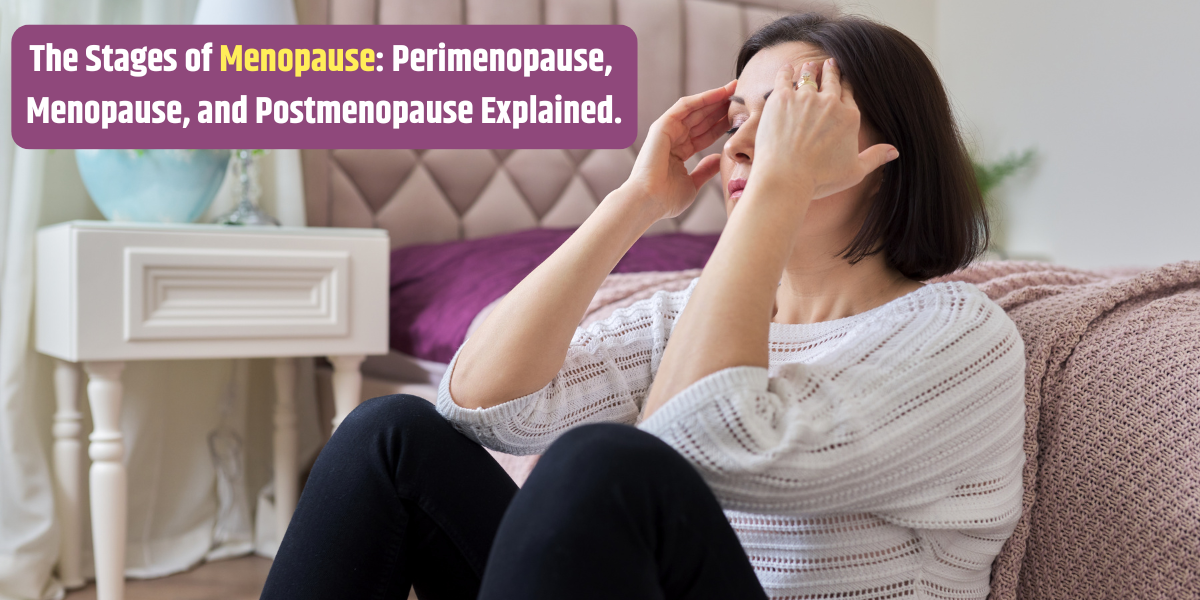The Stages of Menopause: Perimenopause, Menopause, and Postmenopause Explained.
Menopause is an important stage in every woman’s life, bringing physical, emotional, and hormonal changes. Knowing about the stages of menopause—perimenopause, menopause, and postmenopause—can make it easier to manage. If you need guidance, Dr. Manisha Kulkarni, a Menopause Specialist in Magarpatta, can help you understand and navigate this phase of life.
What is Perimenopause, and How Long Does It Last?
Perimenopause, or the menopausal transition, is the time before menopause when hormonal changes begin. It usually starts in a woman’s 40s but can happen earlier. During this stage, symptoms may include:
Irregular periods: Cycles may become shorter, longer, heavier, or lighter.
Hot flashes and night sweats: Sudden feelings of heat or sweating, often disrupting sleep.
Mood changes: You may feel more irritable, anxious, or emotional.
Sleep problems: Trouble falling or staying asleep is common.
Perimenopause can last for a few months to several years, with an average of 4–6 years.
What Signals the Shift from Perimenopause to Menopause?
Menopause is confirmed when a woman has not had a menstrual period for 12 months in a row. This means the ovaries have stopped releasing eggs, and hormone production has decreased significantly.
What Happens During Menopause?
Menopause usually occurs between ages 45 and 55, with the average age being 51. Symptoms at this stage may include:
Vaginal dryness: Hormonal changes can make vaginal tissues less lubricated.
Lower libido: Some women experience a reduced interest in sex.
Bone health issues: Decreased estrogen can weaken bones and increase the risk of fractures.
Weight gain: Hormonal shifts may lead to changes in body fat, especially around the abdomen.
Some women may have mild symptoms, while others experience more noticeable changes. Treatment options like hormone therapy, lifestyle adjustments, and over-the-counter remedies can help manage symptoms.
What Happens After Menopause?
Postmenopause begins once menopause is complete. This stage lasts for the rest of your life. During this time:
Hormones stabilize at lower levels.
Some menopause symptoms, like hot flashes, may reduce, but others, like vaginal dryness, can persist.
Risks for health issues like osteoporosis and heart disease may increase.
Can Menopause Symptoms Be Managed Naturally?
Yes, many women choose natural ways to handle symptoms, such as:
Healthy eating: Include calcium-rich foods and reduce caffeine and alcohol.
Exercise: Activities like walking and weightlifting can support bone health and improve mood.
Stress management: Practices like yoga and meditation can help manage hot flashes and emotional changes.
Herbal remedies: Black cohosh or red clover are popular but should be discussed with a doctor.
If you’re exploring natural approaches, Dr. Manisha Kulkarni, a well-known Menopause Specialist in Magarpatta, can provide helpful advice for managing menopause effectively.
When Should You Visit a Doctor?
You should see a doctor if:
Symptoms disrupt your daily life.
Bleeding is unusually heavy or happens after menopause.
You have concerns about conditions like bone loss or heart disease.
A doctor can recommend options like hormone therapy, medication, or other strategies to address your symptoms. If you’re in Magarpatta, Dr. Manisha Kulkarni is experienced in helping women through all stages of menopause.
Does Menopause Affect Mental Health?
Hormonal changes during menopause can lead to mood swings, anxiety, or depression. If you feel overwhelmed or these issues continue, speaking with a doctor or counselor can help.


